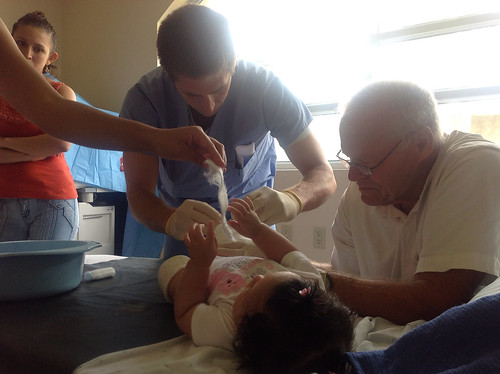Day 3
Portoviejo
Today is a clinic day. While the doctors and others run the clinic, I have offered to help in any way I can. I most stay in the background until I'm needed.
That allowed me to spend time with a local pastor. He serves a church here in town. It sounds like a growing, dynamic congregation. His heart is to serve his people in their discipleship and their learning to serve others in some very real and practical ways. They are working on developing their DNA in that realm. Another important part of their DNA is the multiplication of this model. They feel that to become manageable and effective, they must plant more churches in this same way. I applaud him for his vision of ministry: multiplication undergirded with service and service undergirded with multiplication. We had great discussion and the sharing of ideas about how to continue ministry, each in our own contexts, and encourage one another along the way.
Speaking of service, I stumbled upon an intereststing conversation about justice today. I was talking with a couple of 20 somethings about what it means to bring justice. Can justice be found in our world? How does justice come? For that matter, what does justice mean at all? First of all, biblical justice does not mean as we think of it terms of the court system. It is not necessarily a blinded woman balancing scales. There is a place for that. But that is not the kind of biblical justice we mean. Biblical justice seems to side with the poor, the disenfranchised, the oppressed, the outcast. Look at the people with whom Jesus spent His time. Jesus was faulted for spending his time with the lowly and the outcast. He was faulted by people who were supposed to be defending the causes of these "lowly" people. Instead these religious leaders were casting stones at the oppressed, lame, blind, and outcast. What about in the modern church? Do we side with the religious leaders of New Testament times and put our noses up and those who are "beneath" us? Or do we side with Jesus who decided to extend an open hand to all God's children? Jesus was about the work or healing relationships, setting the oppressed free, helping others see their captivity and then releasing them from it (or maybe the other way around). He took the side of the poor, the downcast and the brokenhearted. Shouldn't we do the same?
In order to truly work for justice in this world, we must practice the justice that Jesus practiced. We have to speak up for those who cannot speak for themselves. We must be on the side of those that society has forgotten (or wants to forget). That means that we must be willing to do so in the places at our doorstep. It means that we must be willing to go even to the furtherest reaches. It means that we must begin to model, in our own lives, the things that Jesus did.
How do we even begin such an endeavor? We cannot do it of our own works or our own merit. We must remember the greatest commandment. Jesus says that is to love God and love our neighbor. How do we serve? We fall in love. We fall in love with God. We fall in love with His people. Then we cannot help but to do the things of love.

No comments:
Post a Comment